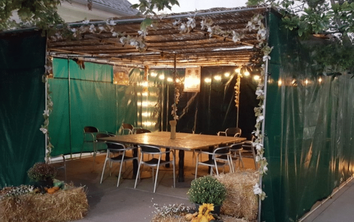| We made it through the High Holy Days of 5784. We rang in the Jewish new year. We honored its double-celebration confluence with Shabbat. We stood together forgiven on Kol Nidre night. We plunged and soared on Yom Kippur, whose last shofar blast re-entered us into life after the High Holy Days. Now we get to celebrate together. The festival of Sukkot, our "Season of Joy," begins the evening of September 29 – yet again coinciding with Shabbat. So we're off the Torah cycle for two more weeks while we revel in Sukkot and hang out in a sukkah. You don't have a sukkah? It's still Sukkot, and there are lots of ways to celebrate. |
 Not Rabbi David's sukkah . :)
Not Rabbi David's sukkah . :) "Festivals" like Sukkot are a special category of Jewish time. Even more than other holidays, festivals are just that – festive. (Take that in: among the Jewish mitzvot is to experience sustained joy as a matter of religious / spiritual practice and mandate.)
Festivals also bring forward the ancient practice of a "pilgrimage." In Temple days, Israelites would bring the best of their harvests (or cash equivalents) to Jerusalem for a communal celebration. Each year at Passover, Shavuot and Sukkot (and Shemini Atzeret: tune in next week!), ancients would assemble for ritual partying. (These gatherings also were sound collective economics: part of each person's festival offering was to support the collective religious regime. Still, folks themselves were commanded to celebrate.)
Imagine a seven-day rave timed to the spring and fall harvests. That's the agricultural core of what became Passover and Sukkot, (Perhaps the post-modern equivalent would be Burning Man in the Nevada desert – though without 2023 Burning Man's extreme flooding.)
But how about us?
Aside from synagogue observances, Sukkot's key ritual involves building a sukkah and waving lulav and etrog. On its face, the sukkah – the temporary non-dwelling dwelling, whose walls aren't walls and whose roof isn't a roof – seems an utter anachronism. And perhaps it is, except there's deep meaning that aligns with the core of joy.
So, About the Sukkah
First, a sukkah seems superfluous – utterly unnecessary. Even more, for a people of historic pragmatism that prevailed over daunting odds amidst ancestral scarcity, a sukkah seems an extraordinary extravagance. (And a troublesome one at that, though nowadays DIY sukkah kits can be assembled in just an hour. Even Rabbi Unhandy over here can do it.)
That's the first point about a sukkah: it's not something we "need." After so much individual and collective focus on needfulness, urgencies and problems, Sukkot is about gathering friends and splurging in gratitude for our blessings.
Next is that a sukkah seems ridiculous. Sukkot decorations are campy: popcorn strings? blinking lights? plastic fruit? All good! I've seen a sukkah that managed a chandelier; another looked like a South Pacific tiki hut from Gilligan's Island. Pure fun. Joy for no purpose other than the joy of joy itself.
Next is that a sukkah is outdoors and temporary. We're coaxed outside (while the getting is still good), to a flimsy structure that's to be entirely temporary (not from, say, a pergola hammered in place). We're reminded that joy connects to nature, and that it – joy, seasonable abundance, even our own selves – are temporary.
We encountered this last valence – that human life has an expiration date – on Yom Kippur. But Sukkot feels different. If Yom Kippur was transcendent, Sukkot is seemingly the opposite: earthy, organic, freewheeling. Sukkot is more like "eat drink and be merry, for tomorrow" who knows? And yes, that "why not celebrate?" impulse has a home on Judaism's calendar: Sukkot.
Please come to my sukkah on October 1 (weather permitting!). Registration is elsewhere in this newsletter.
Sukkot Without a Sukkah?
Even without a sukkah, we can still honor the gist of Sukkot. Invite friends to your home just because. Celebrate being together. Celebrate being. Just because.
After all the High Holy Day intensity, the concentrated introspection and our ritual brush with death, celebrate life and ease.
After the spiritual walls that fell at Tisha b'Av, and the internal walls of ego and resistance that were the target of the High Holy Day season, celebrate the lightness of being. Celebrate that there's no need for internal self-defense. Celebrate the joy of living without all the walls. (That's why a sukkah is a hut without real walls and without a real roof: who needs protective walls when we're just so glad to be alive and together?)
That's the modern core of Sukkot – joy beyond the walls. It's a core we can aspire to embrace with or without the ancient rituals.
So for Sukkot, gather with friends and family. Splurge on meals and entertainment. Take time just to enjoy, and know that you're aligning with an ancient practice so deep and high that, to Jewish mystics, Sukkot was the festival and joy is the pinnacle of Jewish spiritual life.
Let that journey of joy be our pilgrimage festival this Sukkot. From my heart to yours, חג סוכות שמח / hag sukkot same'ah / Happy Sukkot! See you online on September 29 for an especially festive Sukkot-Shabbat (broadcast from my sukkah), and on Sunday, October 1 (starting 1:00pm) at my home sukkah. (Shir Ami members only: registration required via the website.)
Festivals also bring forward the ancient practice of a "pilgrimage." In Temple days, Israelites would bring the best of their harvests (or cash equivalents) to Jerusalem for a communal celebration. Each year at Passover, Shavuot and Sukkot (and Shemini Atzeret: tune in next week!), ancients would assemble for ritual partying. (These gatherings also were sound collective economics: part of each person's festival offering was to support the collective religious regime. Still, folks themselves were commanded to celebrate.)
Imagine a seven-day rave timed to the spring and fall harvests. That's the agricultural core of what became Passover and Sukkot, (Perhaps the post-modern equivalent would be Burning Man in the Nevada desert – though without 2023 Burning Man's extreme flooding.)
But how about us?
Aside from synagogue observances, Sukkot's key ritual involves building a sukkah and waving lulav and etrog. On its face, the sukkah – the temporary non-dwelling dwelling, whose walls aren't walls and whose roof isn't a roof – seems an utter anachronism. And perhaps it is, except there's deep meaning that aligns with the core of joy.
So, About the Sukkah
First, a sukkah seems superfluous – utterly unnecessary. Even more, for a people of historic pragmatism that prevailed over daunting odds amidst ancestral scarcity, a sukkah seems an extraordinary extravagance. (And a troublesome one at that, though nowadays DIY sukkah kits can be assembled in just an hour. Even Rabbi Unhandy over here can do it.)
That's the first point about a sukkah: it's not something we "need." After so much individual and collective focus on needfulness, urgencies and problems, Sukkot is about gathering friends and splurging in gratitude for our blessings.
Next is that a sukkah seems ridiculous. Sukkot decorations are campy: popcorn strings? blinking lights? plastic fruit? All good! I've seen a sukkah that managed a chandelier; another looked like a South Pacific tiki hut from Gilligan's Island. Pure fun. Joy for no purpose other than the joy of joy itself.
Next is that a sukkah is outdoors and temporary. We're coaxed outside (while the getting is still good), to a flimsy structure that's to be entirely temporary (not from, say, a pergola hammered in place). We're reminded that joy connects to nature, and that it – joy, seasonable abundance, even our own selves – are temporary.
We encountered this last valence – that human life has an expiration date – on Yom Kippur. But Sukkot feels different. If Yom Kippur was transcendent, Sukkot is seemingly the opposite: earthy, organic, freewheeling. Sukkot is more like "eat drink and be merry, for tomorrow" who knows? And yes, that "why not celebrate?" impulse has a home on Judaism's calendar: Sukkot.
Please come to my sukkah on October 1 (weather permitting!). Registration is elsewhere in this newsletter.
Sukkot Without a Sukkah?
Even without a sukkah, we can still honor the gist of Sukkot. Invite friends to your home just because. Celebrate being together. Celebrate being. Just because.
After all the High Holy Day intensity, the concentrated introspection and our ritual brush with death, celebrate life and ease.
After the spiritual walls that fell at Tisha b'Av, and the internal walls of ego and resistance that were the target of the High Holy Day season, celebrate the lightness of being. Celebrate that there's no need for internal self-defense. Celebrate the joy of living without all the walls. (That's why a sukkah is a hut without real walls and without a real roof: who needs protective walls when we're just so glad to be alive and together?)
That's the modern core of Sukkot – joy beyond the walls. It's a core we can aspire to embrace with or without the ancient rituals.
So for Sukkot, gather with friends and family. Splurge on meals and entertainment. Take time just to enjoy, and know that you're aligning with an ancient practice so deep and high that, to Jewish mystics, Sukkot was the festival and joy is the pinnacle of Jewish spiritual life.
Let that journey of joy be our pilgrimage festival this Sukkot. From my heart to yours, חג סוכות שמח / hag sukkot same'ah / Happy Sukkot! See you online on September 29 for an especially festive Sukkot-Shabbat (broadcast from my sukkah), and on Sunday, October 1 (starting 1:00pm) at my home sukkah. (Shir Ami members only: registration required via the website.)


 RSS Feed
RSS Feed